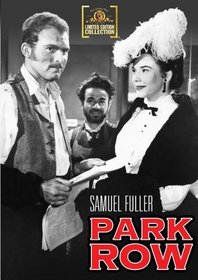| Actors: Gene Evans, mary Welch, Bela Kovacs Director: Samuel Fuller Creator: Samuel Fuller Genres: Drama Sub-Genres: Drama Studio: MGM Format: DVD DVD Release Date: 05/02/2011 Release Year: 2011 Run Time: 1hr 23min Number of Discs: 1 SwapaDVD Credits: 1 Total Copies: 0 Members Wishing: 3 MPAA Rating: Unrated |
Search - Park Row on DVD
  | Park Row Actors: Gene Evans, mary Welch, Bela Kovacs Director: Samuel Fuller Genres: Drama UR 2011 1hr 23min |
Larger Image |
Movie Details
We're sorry, our database doesn't have DVD description information for this item. Click here to check Amazon's database -- you can return to this page by closing the new browser tab/window if you want to obtain the DVD from SwapaDVD.
Click here to submit a DVD description for approval.
|
Member Movie ReviewsReviewed on 7/5/2025... To understand Samuel Fuller's 1952 film "Park Row," it helps to understand Fuller himself. He effectively grew up amongst the personnel and machinery of the newspaper business; his older brother Ving was a fairly prominent political cartoonist. Later, Fuller was an infantryman in WW2 and saw extensive action in multiple theaters, including the liberation of the Falkenau concentration camp.
Fuller's films, subsequently, are based in a gritty realism while aspiring to lofty ideals. "Park Row," one of Fuller's earlier films, is soaked in as much idealism as it is in printers' ink. So much idealism, in fact, that the story becomes almost an afterthought. Down-on-his-luck newspaperman Phineas Mitchell openly dreams about how he would run a newspaper. One fateful night at the local watering hole, he meets a man who owns the machinery, but doesn't know how to run a paper. The men join forces and Mitchell launches "The Globe," to great success. Unfortunately this raises the ire of the femme fatale, Charity Hackett, and the paper she owns, "The Star." The conflict sets up characters to make numerous lofty speeches about the importance of a free press and journalistic integrity. Important points, ham-fistedly made. Oddly enough the plot reminded me of "I, Tonya." Hackett wants Mitchell's paper shut down, by any means necessary, but acts shocked! when the situation devolves into violence. In the end, following a scandal involving charity drives for the Statue of Liberty, Hackett nobly shuts down her own paper in deference to the clearly morally superior Globe. Like I said, the film drips with idealism. Journalism, like a lot of things in life, can be a useful tool or a deadly weapon. "Park Row" acknowledges both aspects, but simplifies and generalizes both. Grade: C+ |

